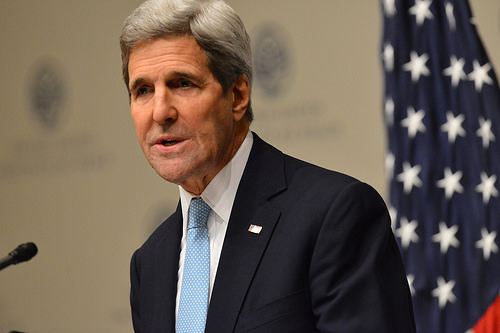 Secretary of State John Kerry interview with David Pujadas of France 2.
Secretary of State John Kerry interview with David Pujadas of France 2.
QUESTION: (Via interpreter) How can the U.S. help France more in the fight against terrorism? Are you ready, for example, to share more intelligence, military intelligence on Syria?…
SECRETARY KERRY: We will – I just met this morning with President Hollande, and we talked about the need to exchange every bit of information that we can, to cooperate in terms of targeting, to cooperate on our military efforts, and to lift our military efforts to do more. I am convinced we have made progress. People don’t realize that. Daesh is now controlling 25 percent less territory. We have liberated Tikrit, liberated Baiji. We have liberated Kobani. We have liberated other towns in Syria. We are now moving to put greater pressure on them and cut them off from Mosul to al-Raqqa. And as a result, Daesh will feel more and more pressure over the course of these next weeks and months, and I think more people are prepared to enter the fight understanding the seriousness of what is happening with fighters spreading through the world. We have to end what is happening in Syria and Iraq as soon as possible.
QUESTION: (Via interpreter) The pace of bombings that quickened of late, will that continue at the same pace? The intensity of bombings will remain the same?
SECRETARY KERRY: Well, that always depends sort of on the targeting to some degree, but the answer is predominately yes. We conducted some strikes in the last couple of days which took out 161 oil trucks, which is how Daesh is getting its money. It’s smuggling oil across the borders into Iraq, into Turkey, and it provides a very significant amount of money. Well, we’re going after that now. And I think with an increased pace, Daesh is going to find it much harder to try to do the things that it’s been doing. It doesn’t mean they won’t have the ability, unfortunately, to encourage some deranged, alienated person somewhere to go kill themselves and, unfortunately, kill other people when they do. The difficulty in counterterrorism is the terrorist just has to be effective or good once, and if someone wants to kill themselves, they can kill other people. We, in law enforcement, in counterintelligence, in all of our military efforts to stop them, have to be effective every single day, 365 days a year. We’ve been pretty effective at that since 9/11, but we will not be able to stop every incident until we stamp out the headquarters, the leaders, down through the fighting ranks, and make it clear the world is not going to tolerate this kind of activity, this kind of disruption.
QUESTION: (Via interpreter) But many experts believe that we can’t win this war without troops on the ground. You are the most powerful army in the world. Is it because the wars in Afghanistan or Iraq were difficult, were lost, that you no longer want to send boots on the ground?
SECRETARY KERRY: (In French.) You need people on the ground, but not us, because it hasn’t proven to be the most effective. You need the people who live there to come in underneath the removal of Daesh and take over the responsibilities. This is why the political track is so critical. We have Iran and Russia at the table for the first time. If we can get the political track moving in the next weeks – not months, in the next weeks – if we can bring the opposition together with Assad’s negotiating team, then we can have a ceasefire. We believe we are weeks away from the possibility of a ceasefire. And then we have the ability, if we can effectively put the transition of the government in place, to mobilize the government forces together with the opposition to all go after Daesh. That’s the most effective way to go after them.
QUESTION: (Via interpreter) But it means that Assad’s leaving is no longer a precondition for —
SECRETARY KERRY: The departure of Assad is still essential, not because I say so or France says so or another country, but because you literally cannot stop the war if Assad is there. Assad is the magnet for these foreign fighters who come and fight now. They want the removal of Assad. Assad has lost the credibility of his people. Three-quarters of Syria are displaced people and refugees. He’s only governing now about 25 percent of the country. And so how can he – the man who has gassed his people, barrel bombed his people, starved his people, tortured his people, killed his people – turn around and bring these people back to Syria and have legitimacy to govern?So it’s not some inappropriate dictate by world powers that said Assad has to go. It’s because practically speaking, you cannot stop those people who feel aggrieved from fighting against Assad. You have a combination of a civil war and a proxy war, and the proxy war is sectarian and very dangerous, and that’s why we think it is so imperative to try to stop this as fast as possible.
Image: Secretary of State John Kerry, Nov. 12, 2015 (photo: Department of State)
